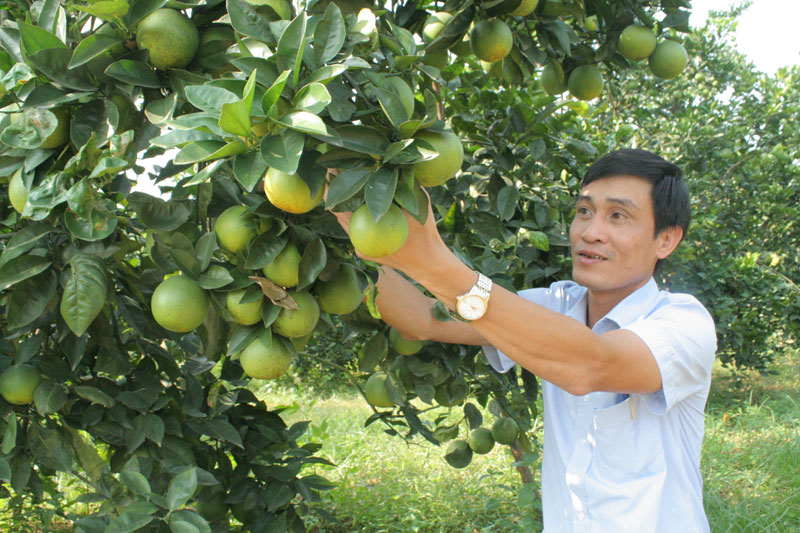
(HBO) – Acknowledging the values and thought of late President Ho Chi Minh in his Testament five decades ago, the Party Organisation and and people of Lac Thuy district have stepped up promotion of patriotic emulation movements and implementation of the Politburo’s Directive No.5 on promoting the studying and following of President Ho Chi Minh’s thought, morality and lifestyle, according to Vice Secretary of the district’s Party Committee Bui Van Truong.
The district has
also strived to successfully implement the Party’s resolution on building the
district as an economic growth engine for the province and a new-style rural
district by 2020, Truong said.
![]()
 A staff of Lac Thuy’s Division of Agriculture and
Rural Development examines quality of oranges grown in Phu Thanh commune.
A staff of Lac Thuy’s Division of Agriculture and
Rural Development examines quality of oranges grown in Phu Thanh commune.
Fulfilling the
late president’s wish "we may indeed have to endure greater difficulties and
new sacrifices, but we are bound to win total victory,” soldiers and people in Lac Thuy stood side by
side with others across Hoa Binh
province to both produce and
fight the enemy. They contributed hundreds of tonnes of food and
dispatched thousands of youths to the battlefields, helping the South to
gain the victory on April 30, 1975.
From a
agricultural district, Lac Thuy has made endless efforts to develop the local economy and improve people’s living
standards.
Last year, the proportion of agriculture and forestry in the localeconomy decreased to about 30
percent while those of services and industry expanded to 43.3 percent and 25.6
percent, respectively. Per
capita income reached 38.9
million VND and the poverty rate plunged to 9.66 percent.
The district has
developed a forest economy, large-scale farms of citrus fruits and safe
vegetables, and high-value livestock farming towards sustainability. It has
seen the expansion of large-scale farms with 65 farms granted with certificates which generate an
average annual profit of 530 million VND per farm. Eight out of 13 communes in
the district have earned the status of new-style rural area.
The district has
also effectively mobilised different resources to develop its infrastructure and improve its business climate in order to attract more
investment. It houses a number of the province’s major projects, mostly in
industry, tourism and services, expected to create a greate momentum for the
local socio-economic development.
Additionally, it
has achieved many important results in the Party and political system building work./.
In the spirit of "Party members go first, the people follow”, all households of Party members in the Doan Ket sub-region in Da Bac town, Da Bac district, voluntarily removed gates and fences, and donated land when the road expansion project passed through their properties. Inspired by their example, 68 households in the sub-region quickly followed suit, contributing over 1,400 sq.m of residential and perennial cropland to widen the main road through the residential area. The exemplary role of Party members in Doan Ket stands as a shining example of studying and following President Ho Chi Minh’s thought, morality, and lifestyle.
The Hoa Binh provincial People's Committee held a monthly meeting on May 29 to assess the implementation of socio-economic development tasks in the first six months of 2025, the progress of key projects, and some other important issues.
During his lifetime, President Ho Chi Minh always expressed his deep affection and special concern for children and youth. He once emphasized: "Caring for and educating children well is the responsibility of the entire Party and the entire people”; "First of all, the family (i.e. grandparents, parents, siblings) must do this job well”. "the Party Committees…, the Children’s Committee, the Youth Union, the education sector, and all related organizations must have specific plans to ensure children grow healthier and more progressive”. His teachings has been remaining valuable and serving as the guiding principles in the work of protecting, caring for, and educating children. In line with this ideology, Hoa Binh Province has continuously been prioritizing and investing resources in the well-being of children in recent years.
Mr. Nguyen Phi Long, the alternate Member of the Party Central Committee and Secretary of the Provincial Party Committee chaired the meeting of the Standing Committee of the Provincial Party Committee to provide opinions on several investment projects within the province. There was the attendance of Ms. Bui Thi Minh, the Permanent Deputy Secretary of the Provincial Party Committee and Chairwoman of the Provincial People’s Council; Mr. Bui Đuc Hinh, the Deputy Secretary of the Provincial Party Committee and Chairman of the Provincial People’s Committee and other members of the Standing Committee; the leaders from other departments, agencies, and some localities.
The Standing Board of the Vietnam Fatherland Front (VFF) Committee of Hoa Binh province held a meeting on May 28 to honour outstanding village elders, village heads, and reputable individuals from local ethnic minority and religious communities.
In mid-May, the provincial Museum organised an exhibition named "Duoi la co Dang Cong san Viet Nam quang vinh” (Under the flag of the glorious Communist Party of Vietnam). This meaningful activity took place in the joyful atmosphere to celebrate the country's major holidays and the Party congresses at all levels for the 2025-2030 term, towards the 14th National Party Congress.



 A staff of Lac Thuy’s Division of Agriculture and
Rural Development examines quality of oranges grown in Phu Thanh commune.
A staff of Lac Thuy’s Division of Agriculture and
Rural Development examines quality of oranges grown in Phu Thanh commune.